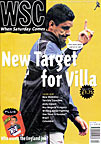 Two men, one backside and a whole lot of controversy
Two men, one backside and a whole lot of controversy
Such is the intense spotlight trained on Premiership football these days, we are told, that nothing escapes the attention of the action replay cameras and the press provocateurs who feed on their evidence. In a limited way, the theory is perfectly true. Yet for all the microscopic detail now available to the media and the authorities alike, football still has blind spots about certain subjects, which go unmentioned even when they are shouting to be heard. One such came up, but only very slowly, after the Chelsea v Liverpool match on February 27th. The repeated clashes between Robbie Fowler and Graeme Le Saux were highlighted on Match of the Day and splashed all over the Monday papers, but the issue at the heart of the matter was not made plain until the Tuesday.
The sequence of events bears repeating. Le Saux was baited by the visiting fans throughout the first half with references to his alleged homosexuality. Early in the second half Fowler caught Le Saux late and was booked. As Le Saux prepared to take the free-kick, Fowler, standing ten yards away, twice presented his backside to Le Saux in an obviously suggestive fashion. A livid Le Saux stepped away from the ball, in apparent disbelief, and was promptly booked for time-wasting by referee Paul Durkin. A few minutes later he swiped at Fowler with the ball nowhere near and, as Durkin later admitted, would have been sent off had any of the officials seen it.
In the immediate aftermath, the media’s reluctance to say the words “gay” and “football” in the same sentence meant that a grossly unbalanced account of the incident became current. The implications of Fowler’s gesture were un- mistakable to everyone in the ground. Everyone, that is, except Mr Durkin and the inhabitants of the press box, all (with one exception) apparently deaf to the insistence of thousands of Liverpool fans that Le Saux, as they put it, “takes it up the arse”.
Instead, attention was initially focused almost exclusively on Le Saux’s reaction. It was “typical petulance” the Independent scolded, “crazy” according to the News of the World. He made a “grotesque fuss” said the Mail on Sunday. Fowler, for his part, was let off with little worse than “childish” (the Mirror).
But if ever there were grounds for invoking ungentlemanly conduct, Fowler surely fulfilled them. As the lone reporter to get to the heart of the incident on the Monday, the Daily Mail’s Martin Lipton, put it, Fowler’s gesture was “crude, unedifying and deeply offensive, another in the long-running, asinine and patently false slurs on Le Saux’s sexual orientation”.
The following day several more of the tabloids found it in them to use language that left no one in any doubt what had gone on, while the broadsheets still preferred such weasly circumlocutions as “inflammatory and intimidatory behaviour”. For many Mail readers, presumably, the issue is made easier by the fact that they consider homosexuality an evil in itself. But you don’t have to agree with that to find Fowler’s conduct disgraceful. Like David Batty, who allegedly sparked the famous brawl with Le Saux in Moscow by calling him a poof, Fowler’s point was simple. Football is for men who conform to a certain ideal of what a man is: aggressive, inarticulate, misogynistic and definitely one of the lads.
Players who don’t conform, like the notoriously antique-collecting, Guardian-reading Le Saux, are favoured with the worst insult the lads can think of. It’s the fact that he’s a bit different that bothers them, not his actual sexuality which, as coincidentally made plain in the programme for the Liverpool game, is conventionally hetero.
Fowler’s patent incitement of the crowd to crank up their personal abuse of a fellow professional would have instantly got him into serious hot water if it had involved race or sectarianism rather than sexuality (see Paul Gascoigne’s flute-playing for proof that a gesture often speaks louder than words). Yet rather than spell out what he had done, and the context in which it had occurred, most commentators preferred to point the finger at Le Saux’s temperament. Like victims of racial abuse, he should have risen above it and got on with the game. In which case, of course, it would never have become public.
“Both players come out with very little credit,” Trevor Brooking intoned on Match of the Day, which collectively ran away from the meaning of Fowler’s behaviour like a startled rabbit (“I suppose he was insisting on the ten yards,” John Motson guessed. Is he in a world of his own or just terminally dim?)
But the consequences for both are not the same. Fowler will have done his reputation no harm with the Scouse wags who put his gesture into words. Nor does his punishment seem likely to be as great as Le Saux’s (at the time of writing). Whereas Le Saux emerges with another black mark in the “hot-tempered” column on his cv, a hefty ban and no visible constituency of support within the game. Le Saux usually wins few friends with his stroppy attitude. But on this occasion he had a point.
From WSC 146 April 1999. What was happening this month